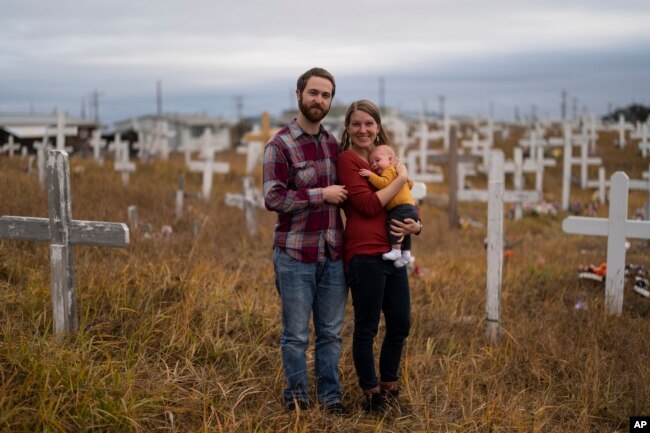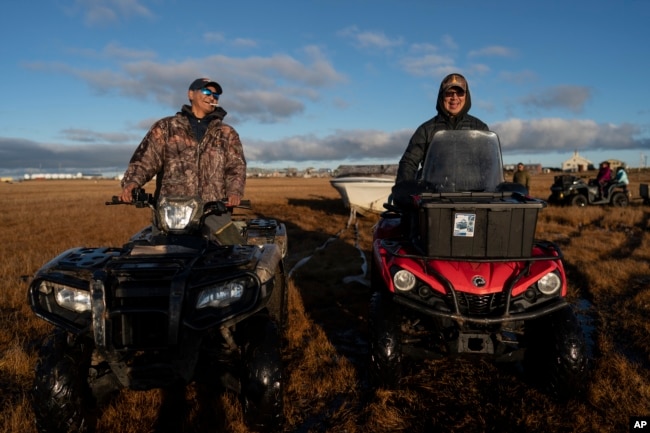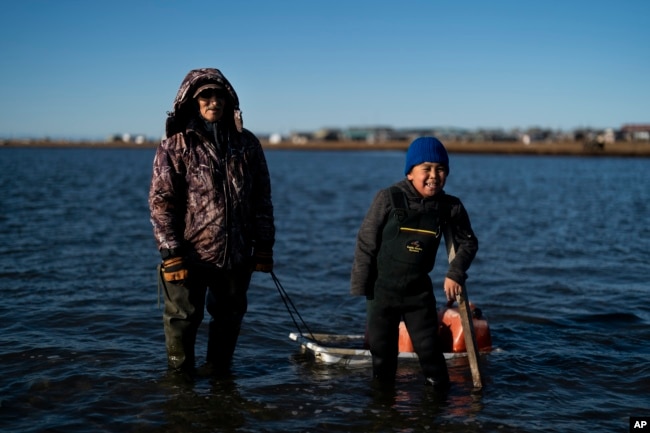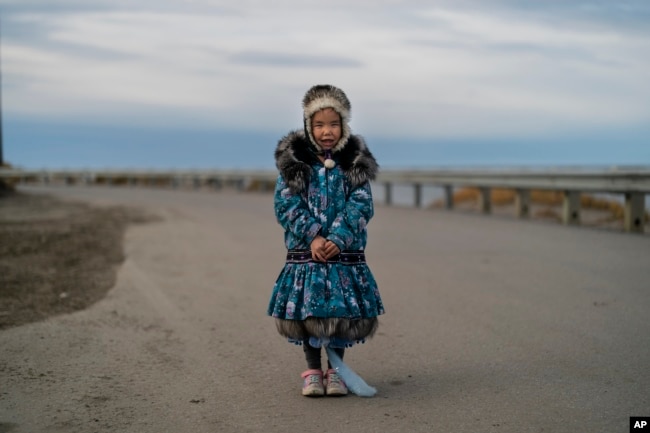気候変動は世界を覆っています。
広く険しい北極圏で、すでに修復不可能なレベルで環境破壊が進んでいます。しっかり見つめて、今、何ができるのか真剣に考えましょう!!
VOAで学びましょう!!
アラスカ島の住民は’差し迫った’状況に直面している(和訳)
Population on Alaskan Island Faces ‘Dire’ Situation
November 06, 2022
アラスカ先住民の村シシュマレフは、ベーリング海峡に近いチュクチ海に浮かぶ沈みゆくバリアアイランド、サリチェフ島にあります。アメリカとロシアの間に位置するこの島は、気候変動の影響により、ますます危機に瀕しています。
この島には、約600人のイヌピアト族が暮らしています。水道などの近代的な技術を持たず、シンプルに暮らしています。
海面上昇、洪水、erosion浸食の増加、海氷と土地の保護機能の喪失は、村人にとって大きな懸念材料です。村から出たいと思う人もいます。
実際、コミュニティは他の場所への移住を提案することに賛成票を投じています。しかし、前回の投票から6年以上経った今も、シシマレフはその場に留まっています。移転は、村が負担できる以上の費用がかかります。
ですから、コミュニティは困難な未来に向かって進んでいます。
村人たちは伝統的な行事を続けています。彼らは、誕生日、baptisms洗礼式、卒業式を祝います。彼らの生活の中心は、家、学校、そして世界最北端のキリスト教会です。
アーロン・シルコ氏は地元のルーテル教会を率いています。彼は、土地の縮小や洪水への懸念は、地域にとって”負担が大きすぎる”と指摘しています。村人たちが気候変動について頻繁に考えるようになれば、自分たちの生活を送る上で支障をきたすことになると彼は言います。誕生日パーティーや葬式、スポーツイベントといったものから遠ざかってしまうでしょう。
「まだ生活は続いているのです」とシルコ氏は言います。
リッチ・スターセンコさんも同意見です。彼は1970年代にシシマレフに移り住みました。彼はこの地域を”resourceful機知に富み””resilient回復力がある”と呼びます。
"ここには犠牲者がいません"と彼は言いました。
問題点
1992年からの30年間で、米国海洋大気庁によると、アラスカの気温は1.4度上昇しました。
北極圏のその地域は、世界の他の地域よりも2倍の速さで温暖化していたのです。今は3倍の速さで温暖化しています。
この島にはすでに人が住めるようなスペースはあまりありません。長さ約5km、幅約400mしかありません。以前は大きな氷の層で守られていましたが、それが溶けてきています。氷がないため、洪水や暴風雨の問題がより多く発生します。海は海岸を埋め立てているのです。2002年には、約14軒の家が内陸に移動しなければなりませんでした。
アラスカにはシシュマレフなど、温暖化で困っている町がたくさんあります。小さな町に住む人たちの多くは、島に最初に住んだ人たちの血を引くnative people先住民です。
米国政府の説明責任室は、気候変動が彼らの問題を悪化させることが予想されると述べています。
ロイド・キユテルクは地元の部族評議会の会長です。
「私は、私たちが移動しなければならなくなるのが怖いのです・・・」と彼は言っています。彼は政府がこの状況を "緊急事態だ......しかし、今のままでは、今まで見たこともないような暴風雨が来ている "と言って欲しくないようです。
政府の指導者たちは、9月の嵐のときに島が問題を起こすだろうと警告しました。当局は、過去50年間で最悪の洪水が起こる可能性があると言います。この嵐はベーリング海峡を通過する際、電気を止め、重要な道路を破壊し、し尿処理センターを水浸しにしました。
モリー・スネルさん35は、嵐について話します。彼女は、村が避難を余儀なくされないことを望んでいると語ります。
「適切な嵐と適切な風があれば、島全体が破壊されるかもしれません」と彼女は言います。気候変動の影響で、島はより“vulnerable脆弱”になっていると彼女は言っています。
誰が悪いのか?
時が経つにつれ、コミュニティはそのあり方を変えてきました。しかし、シシマレフの人たちは、気候変動にあまり貢献していません。非難されるべき温室効果ガスのほとんどは、ヨーロッパや北アメリカ大陸の住民によって生み出されているのです。
エリザベス・マリノ氏は、この状況を "気候の不公正 "と呼びます。
マリノ氏は人類学者であり、人間とそのコミュニティに関する専門家です。彼女はシシマレフの人々を研究し、その結果を本にまとめました。
Population on Alaskan Island Faces ‘Dire’ Situation
The Alaska Native village of Shishmaref sits on the sinking barrier island Sarichef in the Chukchi Sea near the Bering Strait. The island lies between the United States and Russia, where it is increasingly threatened by the effects of climate change.
The village is home to about 600 members of the Inupiat People. They live simply, without running water and other modern technology.
Rising sea levels, flooding, increased erosion and loss of protective sea ice and land is a huge concern for the villagers. Some want to leave.
In fact, the community has voted in support of proposals to resettle elsewhere. Yet, more than six years after the last vote, Shishmaref remains in place. The planned move costs more than the village can pay.
So, the community carries on toward a troubling future.
The villagers continue their traditions. They celebrate birthdays, baptisms and school graduations. Their lives center on their homes, the local school and one of the world’s northernmost Christian churches.
Aaron Silco leads the local Lutheran Church. He called the concern about the shrinking land and floods “too much of a burden” for the community. He said if the villagers think about climate change too often, it will hurt their ability to live their lives. It will take away from things such as birthday parties, funerals and sporting events.
“There is still life happening,” Silco said.
Rich Stasenko agrees. He moved to Shishmaref in the 1970s. He calls the community “resourceful” and “resilient.”
“I don’t see victims here,” he said.
The problem
In the 30 years since 1992, the U.S. National Oceanic and Atmospheric Association says temperatures in Alaska have gone up by 1.4 degrees Celsius.
That area of the Arctic had been warming twice as fast as the rest of the world. Now it is warming three times faster.
The island already does not have much space where people can live. It is only about five kilometers long and 400 meters wide. It used to be protected by a large layer of ice that is melting. The lack of ice means more flooding and more problems from storms. The sea is reclaiming the coast. About 14 homes had to be moved inland in 2002.
There are many towns in Alaska like Shishmaref that are having problems due to warming weather. Most of the people that live in the small towns are native people who are related to the first people to live on the islands.
The U.S government’s accountability office says climate change is expected to make their problems worse.
Lloyd Kiyutelluk is president of the local tribal council.
“I’m scared that we will have to move …” he said. He does not want the government to say the situation is “an emergency … but the way things are, we’re getting storms that we’ve never seen before.”
Government leaders warned that the island would have a problem during a storm in September. Officials said it could bring the worst flooding in 50 years. As the storm moved through the Bering Strait, it cut electricity, destroyed an important road and flooded a human waste treatment center.
Molly Snell, 35, talked about the storm. She said she hoped the village would not be forced to evacuate.
“The right storm, with the right wind could take out the whole island,” she said. She said the island is more “vulnerable” due to climate change.
Who is to blame?
Over time, the community has changed its ways. However, the people of Shishmaref have not contributed much to climate change. Most of the greenhouse gases to blame are produced by populations in Europe and continental North America.
Elizabeth Marino calls that situation an example of “climate injustice.”
Marino is an anthropologist, or an expert on humans and their communities. She studied the people of Shishmaref and wrote a book about her findings.
Words in This Story
erosion –n. the gradual destruction of something by natural forces such as wind and water
baptism –n. a ceremony that makes a person a member of the Christian church
graduation –n. the act of receiving a diploma from a school, college or university
church –n. a building used for Christian religious services
burden –n. something difficult to manage, accept or deal with
resilient –adj. able to become strong again after something bad happens
layer –n. a piece of material that lies on top of or below something else
council –n. a group of people who are chosen to make rules, laws or decisions about something
evacuate –v. to remove someone from a dangerous place
vulnerable –adj. easily hurt or harmed
contribute- v. to help to cause something to happen



